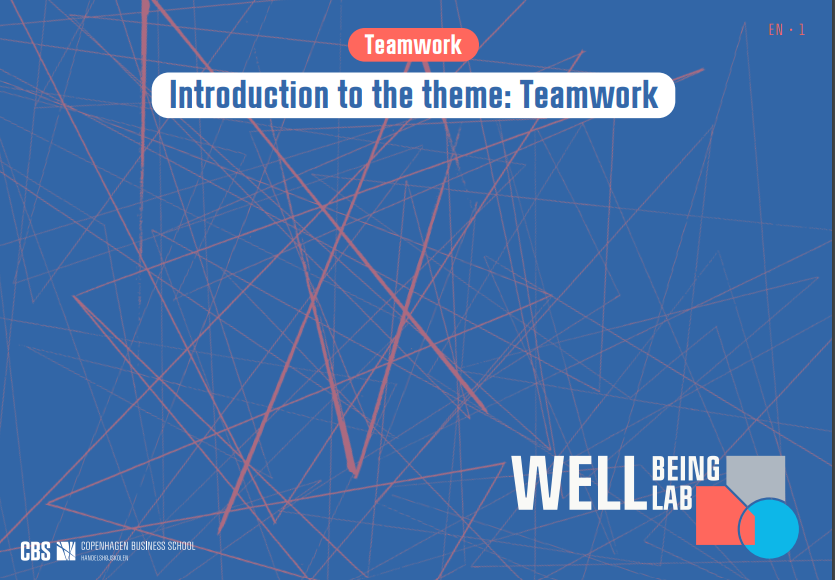Teamwork challenges and pressure

Surprised by the level in which teamwork causes difficulties
When conducting interviews with students concerning stress and lack of well-being several topics came up repeatedly, but one topic in particular surprised Pernille Steen Pedersen – problems with working and being in groups. “I did not see it coming at first, but completely unmotivated the topic of group work was brought up in almost all the interviews with students, when I asked more broadly into stress and pressure” Pernille explains. Surprised by this finding, she started looking more into issues around teamwork and being in groups among students.
“When working in groups, you expose yourself. You have to show what I can figure out and what I can’t figure out. And you must deliver criticism. It can be difficult in a group to hide if there are some things you are insecure about. And then we have this culture telling us that you have to be skilled, and you have to be able to do it all. So, it can be difficult to say that I can’t figure this out.” – CBS student
Why is teamwork so hard?
According to Pernille there are several reasons behind the challenges that arises for students when working in groups. One reasons relates to to expectations, for example students being worried of not living up to the group’s expectation. Another reason can be that varying levels of ambitions among students in a group makes some group members feel, that they have to compromise quite a bit with how they would want to do the work. This produces a tension within the group and for the individuals too. This tension, in turn, gives rise to worrying thoughts like “what are the others thinking about me, am I doing my part of the work good enough, am I good enough.” These doubts can be difficult to express aloud and share with others. Therefore, it becomes a form of pressure, also deriving from ideas about how the ideal student ought to be.
“Across all my interviews I can see a commonality in thoughts about how one is perceived by others, what others might think, and one’s own demands and expectations on oneself. This is a concern that takes up quite some space for many students and it becomes accentuated within the relation of group work” – Pernille Steen Pedersen
Dialogue cards addressing teamwork challenges
The dialogue cards that has been developed on basis of the research findings are build over three central themes, of which one of them is “Teamwork.” The specific cards under this theme will address the challenges students might experience in groups from different angles. Furthermore, the aim is that the conversation it can open and facilitate can help students in their groups work. For example, simply to being able to talk aloud together about differences in ambition levels or the time one is willing to put into the work etc. Below are two examples of the cards addressing teamwork:
Dialogue card example
Here is a quote from a CBS student: “I do not prioritize my studies that much. I am fine with just passing. However, it is enormously stressful to feel wrong when everybody else have high expectations. And constantly believe you are behind, that others are “pulling your weight”, and that you do not live up to the expectations of others.”
Question: If a member of your group felt like this, what would you do to help that person feel more welcome in the group?
Theme: Teamwork, Card 3.A
Dialogue card example
Imagine, for a while you have felt that the other group members do not value your contributions to the academic discussions. Which of the below responses describe best how you would react in such a situation?
1) I turn to my group and tell them how I feel.
2) I keep it to myself because I find bringing it up difficult.
Theme: Teamwork, Card 1.C
Pressure from working in groups have shown to be a main source for lack of well-being and stress.
Our research has found that difficulties in group work is a main cause for why many students express feeling stressed or low in well-being. Working with others can be very challenging, but it is an important skill to learn in order to thrive as a student, but also as a future employee.
A need to train collaborative and teamwork skills more
Literature on group work and dynamics within groups is not in lack, but there is a big step to take from reading about it and then knowing how to address group work challenges in practice in constructive ways. Albeit students often read about group work in methodology books, when in practice they experience problems in the group it can feel awkward, uncomfortable and even stressful to put it into words in the group, feeling like they are not fully equipped to do it in a good way. There seems to be a need to look more into this and find new ways to enable students to train such collaborative skills. It is an important skills to learn how to manage manage within teamwork challenges or difficulties in group dynamics, and it is a life-skill that is much needed when new graduates enter the job market.
Since people are different, their ways of interacting in groups will be different, their ways of learning are different and their ambitions differs, but they have to work together. It is unrealistic to believe that people should become more alike within a group, nor is it desirable. At CBS Well-being lab our aspiration is to understand more about the ways group work triggers pressure or stress among students. On this basis we wish to develop methods and ways for students to acquire transformative capabilities to manage group work challenges and collaborate more constructively, despite differences. We consider this incredibly important to address and valuable in both short and long-term, as similar dynamics will be found in work-life situations after the students graduate.
“We have to be better to talk together, to balance and match expectations, to work constructively with giving and receiving feedback, and to give room for each other’s differences. I think there is a significant need for concrete tools and practical skills to facilitate good dialogues in groups – and a great potential. It is something that needs to be practiced, not only read about in books,” – Pernille Steen Pedersen

Research on psychological safety has shown, not surprisingly, that people feel more safe in groups where the familiarity between the team members are higher. Feeling safe in a group setting means that the person feels comfortable sharing ideas, doubts, insecurities, difficult questions or opposing opinions without fear of what others might think.
Students however come together in many groups during their years of study, some they form themselves and others are set by teachers. Therefore, they will experience having to collaborate in groups where differences in backgrounds, opinions, ambitions, or skills are great – and perhaps where familiarity among team members might be low. It seems that the better familiarly, the more likely students are to share their questions, doubts, critical reflections, or need for assistance etc. So how can we work with this challenge in study environments?
Since students inevitably will have to collaborate with new people on a regular basis – just like it can be the case in their future jobs – and with people they might not know well, it is our aspiration that the dialogue cards can help to create conversations that enables a sharing that normally takes higher familiarity to achieve. Conversations that increases the sense of safety and trust in the group, including making more understanding and room for differences. This can be a way to practice and learn how to have such conversations naturally with others in a group and which ultimately provides the students with skills to contribute to psychological safety in study- and work groups.

Material to explore on this topic
We have different materials on this site specifically focused on the challenges of teamwork and being in groups.
The dialogue cards on the theme of “teamwork” can be used to host productive and constructive conversation to help students in their group dynamics and challenges. We also have some podcasts and videos addressing the theme.
